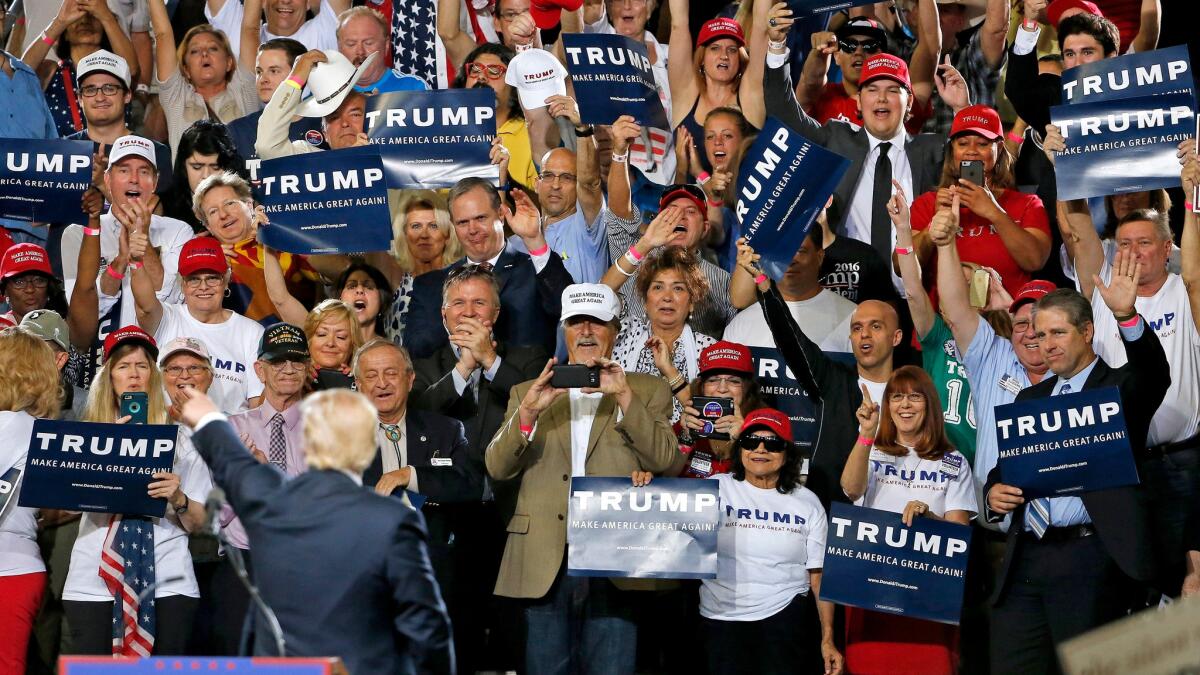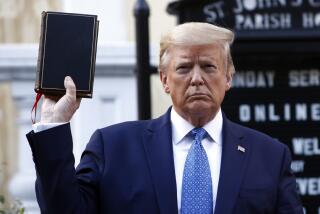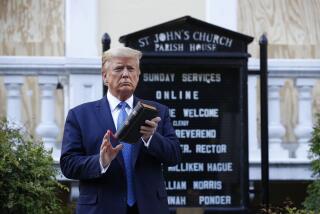Op-Ed: Is Trumpism its own religion?

When Donald Trump meets with several hundred Christian leaders in New York City on Tuesday, it may seem to some that the Religious Right has finally signed the papers on the deal to sell its soul. As they embrace a morally lax loudmouth proud to declare that he has never asked for forgiveness, one wonders how long self-identified “values voters” will continue to claim the name.
Yet there may be something other than bald hypocrisy behind Trump’s evangelical support. The appeal of Trumpism for some Christians, as well as for many who claim no faith at all, might be that it functions as something like a religion in its own right.
Indeed, if we consider his movement as fundamentally religious, in the broad sense of the term, rather than strictly political, his otherwise surprising success begins to make a lot of sense.
This is not about Trump’s alleged Christianity. It’s no revelation that he knows little about the religious tradition he calls his own. His attempts to present himself as godly in “Crippled America” were laughable. (“In business, I don’t actively make decisions based on my religious beliefs, but those beliefs are there — big time.”) And he has apparently barely read the family Bible he uses as a campaign prop.
The religiosity of Trumpism, however, is not dependent on his level of religious literacy. The Church of Trump draws from a deeper well — specifically from what the sociologist Emile Durkheim called the “elementary forms of religious life.”
A century ago, Durkheim proposed in a book by that title that religion might be defined as a system of beliefs and practices that unites a community through the experience of “collective effervescence.” The euphoria of losing oneself in a crowd is projected onto a sacred object as if it is its source, when in reality the collective feeling and the sense of sacredness feed off each other, distancing both from all that is considered profane.
Durkheim obviously never attended a Trump rally, but he might have recognized the dynamics at work. “This effervescence often reaches such a point that it causes unheard-of actions,” he wrote. “The passions released are of such an impetuosity that they can be restrained by nothing.”
Is “messianic” going too far? [Trump] might not say so. ‘If I win,’ he once tweeted, ‘all of the bad things happening in the U.S. will be rapidly reversed!’
That Trump sees the world starkly in terms of winners and losers has become shorthand for his simplistic thinking, but as he uses these terms they also map neatly onto Durkheim’s categories. He gives his followers access to the sacred — winning — while offering protection from the profane influence of Muslims, Mexicans and low-energy losers. He does so mainly through the promise to strengthen borders, which Durkheim called the “limit of the collective personality.”
Seen this way, the Trump mantra “Make America Great Again” also draws on a potent religious idea. While it echoes Pat Buchanan’s race-baiting, anti-immigrant campaigns to “make this country what it used to be — God’s own country” in 1992 and 1996, and Ronald Reagan’s “Let’s Make America Great Again,” from the decade before, its aim is more esoteric. Buchanan’s slogan was about reviving moral standards of a bygone age, Reagan’s was about economic recovery, but Trump’s is a nearly mystical restoration.
When Trump says “again,” he’s not talking about returning to some prior time of plenty or virtue. His totemic trucker hat message is about initiating what can only be described as messianic age — an era in which, to use the Trumpian vernacular, “we’ll have so much winning, you’ll get bored.”
Is “messianic” going too far? He might not say so. “If I win,” he once tweeted, “all of the bad things happening in the U.S. will be rapidly reversed!”
“In the present day just as much as in the past, we see society constantly creating sacred things out of ordinary ones,” Durkheim wrote. “If it happens to fall in love with a man and if it thinks it has found in him the principal aspirations that move it, as well as the means of satisfying them, this man will be raised above the others and, as it were, deified.”
Just so, Trump, a biblical illiterate, has succeeded so far because his followers believe he is a transformative figure who can bring about national salvation. In an election year full of surprises, perhaps the most surprising of all is that Trump voters are motivated by a kind of faith: They believe in the man, and in his promise that all their losing will come to end.
If there is any solace to be found in the possibility that Trump’s rise has been fueled by emotions similar to those that drive religion, it may be that the one thing all messianic movements have in common, sooner or later, is disappointment.
Peter Manseau is the author of several books, including “One Nation Under Gods: A New American History.”
Follow the Opinion section on Twitter @latimesopinion or Facebook
More to Read
A cure for the common opinion
Get thought-provoking perspectives with our weekly newsletter.
You may occasionally receive promotional content from the Los Angeles Times.






